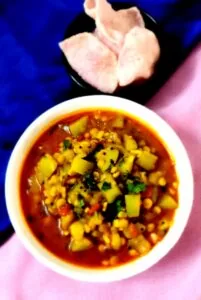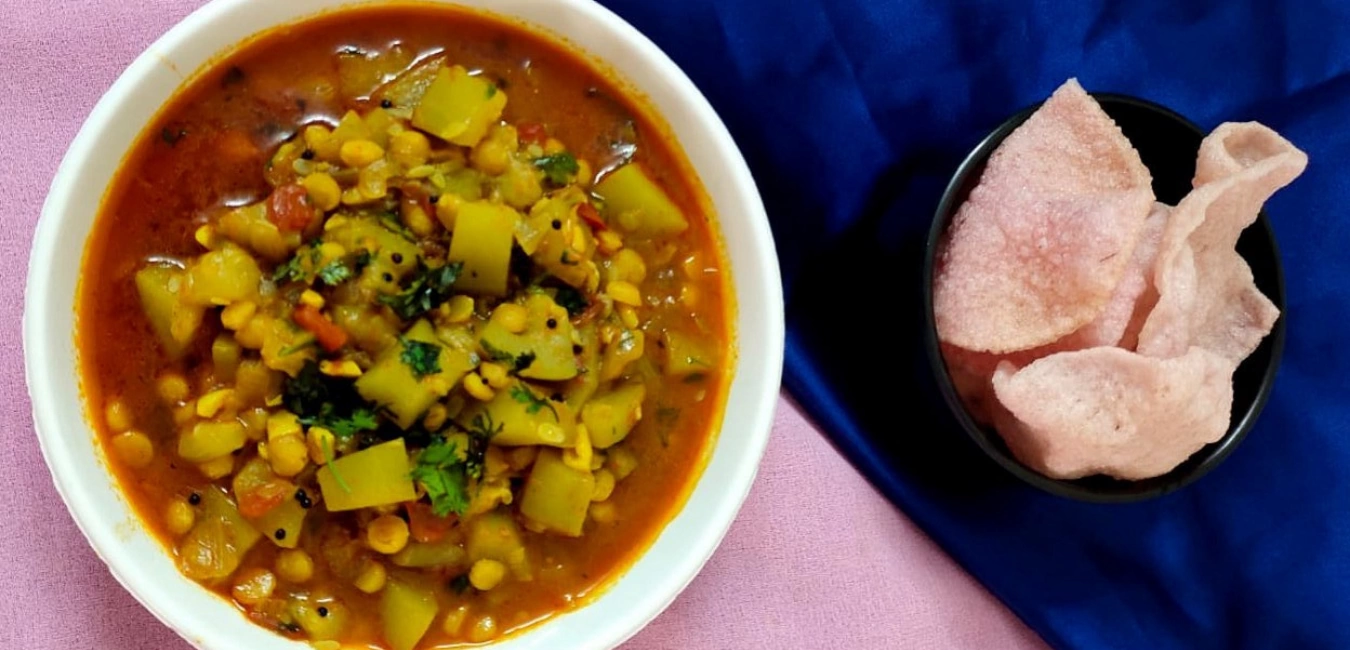Lauki Chana Dal is a simple and healthy curry. They say it is a North-Indian speciality but I remember eating it as a child quite often right here in Mumbai. Good food is beyond boundaries, but YES I do agree this dish is famously North-Indian by origin. That makes me plan my next trip to Punjab. I know I would be swooned by those green lush fields. Maybe would even sing a song or two like seen in those romantic Yash Chopra movies. It is a wonder why I haven’t visited this state yet? I have soo many friends from there. They keep asking me to visit.
Okay, now back to my recipe.
There are few curries which have both lentils and vegtables in them. This curry has the goodness of Bottle Gourd (aka Lauki, Doodhi or Ghiya) and the warmth of Bengal Gram Dal (Chana Dal). It makes a hearty meal when combined with simple rotis or steamed rice.
I personally like to have this light gravy with phulkas with a little crunchy salad and/or papad on the side.
Here, I have soaked the chana dal for a couple of hours before cooking and so cooked this dish in a skillet. If you do not have the time to soak the dal you can still make this dish by pressure cooking it. The preparation time of this dish is quite short (less than 30 mins) and the ingredients too are easily found in our kitchens. It is a thin gravy made with onion and tomato base.
A tender bottle-gourd will cook faster and it imparts a beautiful flavour to this dish. I was fortunate to lay my hands on one that grew on an all-organic farm. So, this cooking experience was one like the Farm-to-Table concept we featured last year on the blog.
My excitement goes next level when one minute I am able to see the vegetable on the plant in all its glory and then straight into my hot pan, cooking on slow fire with those aromatic spices. Because when at the dining table everyone is busy devouring the dish, I know it is the best.
Isn’t the whole experience so awesome?
Bottle-gourd with Chana Dal
Ingredients:
- 1½ cups chopped Lauki (bottle gourd/doodhi)
- ¼ cup chana dal (bengal gram)
- 2 medium sized onions finely chopped
- 1 medium tomato, finely chopped
- ¼ tsp mustard seeds
- A pinch of asafoetida (hing),
- 5-6 cloves of garlic, finely chopped,
- 2 green chillies finely chopped
- ¾ tsp red chilli powder
- 1 tsp coriander powder
- ¼ tsp turmeric powder
- Finely chopped coriander leaves, for garnishing
- Salt to taste
- ¾ cup water
- 2 tbsp Oil
Method :
- Wash and soak chana dal in water for 2-3 hrs.
- Drain soaked chana dal and keep aside.
- Peel, wash, and cut lauki into small pieces.
- Heat 2 tbsp oil in a skillet or kadhai.
- Add mustard seeds; when they begin to crackle, add asafoetida, chopped garlic, and chopped green chillies. Saute for a minute or two.
- Add finely chopped onions and saute till soft.
- Add chopped tomatoes and salt. Cook till soft and mushy.
- Add the red chilli powder, coriander powder, and turmeric powder.
- Stir and cook until everything comes together, it will take around 2-minutes.
- Add soaked and drained chana dal and chopped lauki.
- Mix well and sauté for 3-4 minutes. This step is necessary to enhance the taste of the curry as the lauki cooks with spices in oil brings out the flavor.
- Add 3/4 cup water and mix well. Close the lid and let the gravy cook till the chana dal softens but should still have a bite to it. This should be done in 10 mins on medium flame.
- Once done sprinkle with chopped coriander and give it a final stir and it is ready to serve.

In the pic you can see I have served it with fried beetroot papad. Well, sometimes you don’t eat the regular meals for a change and want to try something different. I scooped this amazing gravy with just the papad.
Tip : The chana dal can soak up some of the gravy as it cools down. In that case, you can add a little extra water depending on how much gravy you would like. Serve this curry with hot phulka, roti or chapatti in lunch. It can also be served with steamed rice, salad and pickle.
Note : Bottle gourd and Cucumber belong to the Cucurbitaceae family. It is advisable to check if there is any bitterness before consuming them. If found bitter they should be avoided.

